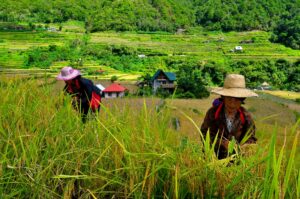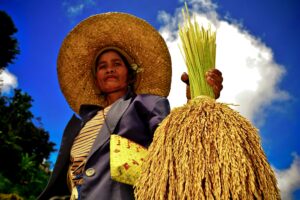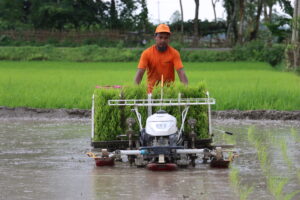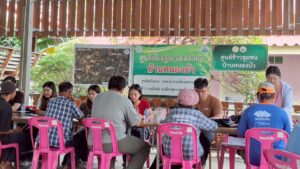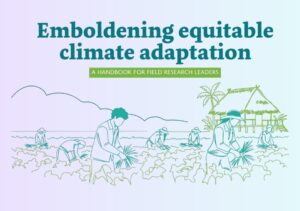Involving farmers and farming communities in decisions about new agricultural technologies or management practices and allowing them to try a technology form the crux of the participatory approach to research. Not only does this give farming communities a sense of ownership, it also ensures that the technologies are sustainable under the farmers’ own management
But is farmer participation alone enough to ensure that new technologies are successfully adopted? Even if a new technology initially proves acceptable to farmers, it may ultimately be policy support from governments that catalyzes its spread. Attracting such support requires that governments themselves also participate in the technology adoption process.
In Bangladesh, the direct seeding of rice with plastic drum seeders provides a good example. A drum seeder consists of a series of perforated drums supported between two wheels. Seeds are placed in the drums and the device is hand-pulled by one farmer, allowing seeds to fall in rows into the puddled field. This technology offers great potential to save labor and increase yield and income for Bangladeshi farmers.
Beginning in the 2003 aman (monsoon) season, an IRRI-led drum-seeding trial had five farmers try the technology in their fields. By the next boro (dry) season, the trial had expanded to include farmers in 56 locations across the country. Now, after just three seasons, demand for drum seeders is rising rapidly. Some 4,000 Bangladeshi farmers are currently using the technology, with hundreds more seeking access to it.
In the early stages of the trials, IRRI, the Bangladesh Rice Research Institute and the Bangladesh Department of Agricultural Extension (DAE) supplied drum seeders to participating farmers. This was designed to be a starting point rather than a sustainable approach. In the longer term, IRRI envisioned a local manufacturer producing and selling drum seeders as a business venture, and local farmers purchasing directly or through retailers. But this is not something that IRRI and its research and funding partners can achieve alone — it requires the backing of the Bangladeshi government. Sure enough, encouraging government involvement has been a critical part of ensuring the policy support needed for widespread adoption of drum seeding.
Through the DAE, the Bangladesh Minister for Agriculture, M.K. Anwar, has already allocated 10 million Bangladeshi taka (US$156,000) to support the project and has pledged to allocate more, as well as subsidize the cost of drum seeders for farmers, with the hope of seeing the technology spread throughout the country in the next 3-5 years. At every turn, the project team has encouraged Mr. Anwar and the State Minister for Agriculture, Mirza Fakhrul Islam Alamgir, to participate in field days and take other opportunities to talk to farmers who have tried the technology. The team now has a strong rapport with the ministers and their offices, and this has been crucial in negotiating further government support. Through their close interest in the technology adoption process, the ministers have become powerful allies and champions of drum-seeding technology.
In West Bengal, India, where drum seeding is in the early stages of trial and adoption, project leaders have already fostered relations with Sukhabilas Barma, the Principal Secretary of the state’s Ministry of Agriculture, and the drum seeder is set to be included under a grant program for new innovation and mechanization. IRRI and its Indian partners have also briefed the Secretary of the national Ministry of Agriculture, Radha Singh, who has pledged her support through further grants to the state government. This will see drum seeders available to farmers at a nominal cost, and associated extension and training activities will be provided.
Without such government endorsement, where would the adoption process be? Certainly, there has been no problem in convincing farmers of the benefits of drum seeding. But without financial and policy support from the governments of Bangladesh and West Bengal, the spread of the technology would flounder. Allowing private enterprise to manufacture and distribute drum seeders — IRRI and its partners cannot simply continue to hand them out — also needs trade and investment policy support, areas well beyond the jurisdiction of the technology’s researchers and developers.
In short, participation with governments — as well as farmers— in technology adoption ensures a far greater chance of ongoing success.
_________________________________________
M. Zainul Abedin is a farming systems specialist, IRRI Social Sciences Division.

